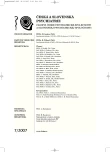-
Medical journals
- Career
Retention in Substitution Programm by Buprenorphine
Authors: A. Večeřová-Procházková; L. Csémy; Z. Staňková; M. Molnárová; P. Jacobs (exnerová); J. Kožený; R. Kobližková; E. Čápová; K. Peláková
Authors‘ workplace: Centrum výzkumu protidrogových služeb a veřejného zdraví (CEPROS), Praha
Published in: Čes. a slov. Psychiat., 103, 2007, No. 7, pp. 329-335.
Category: Original Article
Overview
Objective:
The major objective of the study is to compare retention in maintenance therapy with buprenorphine provided in different treatment settings.Methods:
One hundred and thirty two heroin dependent patients were studied for a period of three months. The mean age of the subjects was 25 years; males were overrepresented in the sample (76 %). The Czech adaptation of Europ-ASI was used for patient’s assessment at intake, relevant information from medical records were collected as well.Results:
The average length of stay in programme was 57.4 days. No significant differences were found in retention in three treatments settings (specialized centre for substitution, general practitioner, and combination of those two). The full three month treatment period was completed by 35 % of patients. Again, there were no differences in treatment completion by treatment setting. The impact of psychosocial factors on retention is discussed briefly.Conclusion:
The results suggest that prescription of buprenorphine by general practitioners led to comparable retention and treatment completion as treatment in specialised centres. We can conclude that buprenorphine maintenance may be effective in routine services provided by general practitioners.Key words:
dependence on heroin, buprenorphine, maintenance programme, general practitioners, retention.
Labels
Addictology Paediatric psychiatry Psychiatry
Article was published inCzech and Slovak Psychiatry

2007 Issue 7-
All articles in this issue
- Atypical Antipsychotics and Prolongation of QTc Interval
- Retention in Substitution Programm by Buprenorphine
- Lack of Insight, Non-compliance and Their Mutual Relations in Schizophrenic Disorder
- Psychotherapy of Depression – the Approach of Gestalt Therapy
- Sexual Revictimization
- Atypical Ending of Posttraumatic Stress Disorder
- Czech and Slovak Psychiatry
- Journal archive
- Current issue
- Online only
- About the journal
Most read in this issue- Atypical Antipsychotics and Prolongation of QTc Interval
- Psychotherapy of Depression – the Approach of Gestalt Therapy
- Lack of Insight, Non-compliance and Their Mutual Relations in Schizophrenic Disorder
- Atypical Ending of Posttraumatic Stress Disorder
Login#ADS_BOTTOM_SCRIPTS#Forgotten passwordEnter the email address that you registered with. We will send you instructions on how to set a new password.
- Career

